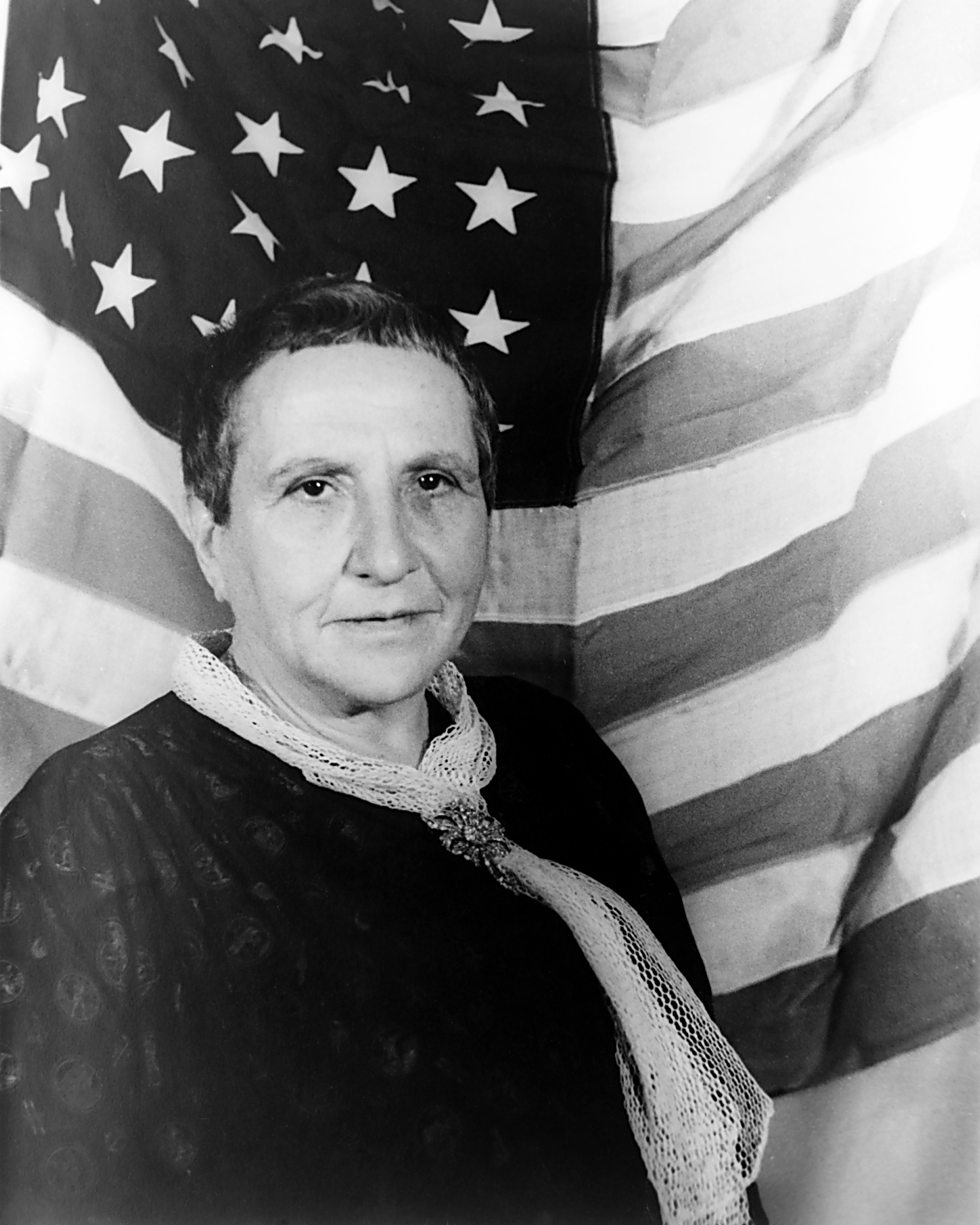Gertrude Stein frasi celebri
Gertrude Stein: VII; p. 239
Autobiografia di Alice Toklas
Origine: Citato in Ernest Hemingway, Festa mobile, traduzione di Vincenzo Mantovani, Mondadori, Milano, 1993, p. 64.
“La pace ha i suoi terrori peggio che la guerra.”
Gertrude Stein: VII; p. 236
Autobiografia di Alice Toklas
Gertrude Stein Frasi e Citazioni
“Assomiglia a quei barcaioli del Mississippi che descrive Mark Twain.”
Gertrude Stein: VII; p. 219
Autobiografia di Alice Toklas
IV; p. 77
Autobiografia di Alice Toklas
“E cosí è fatto Hemingway: ha l'aria moderna e un sentore di museo.”
Gertrude Stein: VII; p. 220
Autobiografia di Alice Toklas
VII; p. 213
Autobiografia di Alice Toklas
“Scrivo per me stessa e per gli sconosciuti.”
Origine: Citato in Fredric Jameson, Firme del visibile. [Hitchcock, Kubrick, Antonioni] (Signatures of the Visible, 1990), traduzione di Daniela Turco, a cura di Gabriele Pedullà, Donzelli, Roma, 2003, p. 23 https://books.google.it/books?id=XIepkdFhIlYC&pg=PA23#v=onepage&q&f=false. ISBN 88-7989-766-7
“Hemingway, i commenti non sono letteratura.”
Gertrude Stein: VII; p. 223
Autobiografia di Alice Toklas
“Braque e James Joyce sono gli incomprensibili che tutti capiscono.”
Picasso: VII; p. 215
Autobiografia di Alice Toklas
Origine: Citato da Jonah Lehrer Proust era un neuroscienziato, Codice edizioni ISBN 978-887578096-8 p.144
Gertrude Stein: Frasi in inglese
Origine: Everybody’s Autobiography (1937), Ch. 5
Origine: Everybody’s Autobiography (1937), Ch. 2
Origine: Everybody’s Autobiography (1937), Ch. 2
“It is always a mistake to be plain-spoken.”
"As Eighty," from Bee Time Vine (1953, Yale University Press); written in 1923
Origine: Everybody’s Autobiography (1937), Ch. 4
“It is not what France gave you but what it did not take from you that was important.”
An American and France (1936)
Four in America (1933)
Origine: Everybody’s Autobiography (1937), Ch. 4, p. 289
What Are Masterpieces and Why Are There So Few of Them (1936), Afterword of a later edition
“As there was never any question there was never any answer.”
Origine: Everybody’s Autobiography (1937), Ch.1
Comment to Ernest Hemingway, Ch. 7
The Autobiography of Alice B. Toklas (1933)
Manuscript (1903), published in Q.E.D. Book 1, from Q.E.D., and Other Early Writings (1971)
“Communists are people who fancied that they had an unhappy childhood.”
Quoted by Thornton Wilder, interview (December 14-15, 1956) with Richard Goldstone, The Paris Review: Writers at Work, First Series (1958)
“It is a difficult thing to like anybody else's ideas of being funny.”
Origine: Everybody’s Autobiography (1937), Ch. 3
Quoted in Really Reading Gertrude Stein : A Selected Anthology with essays (1989) by Judy Grahn (Crossing Press ISBN 0-895-94380-8, p. 253
“Suppose no one asked a question, what would be the answer.”
"Near East or Chicago A Description"
Useful Knowledge (1928)
“Before the flowers of friendship faded friendship faded.”
This phrase was used as the title of a work published in 1931, but was originally used in Ch. LXII of A Novel of Thank You, written in 1925-1926, but not published until 1958 by the Yale University Press
“The deepest thing in any one is the conviction of the bad luck that follows boasting.”
Mrs. Reynolds and Five Earlier Novelettes (1952) Pt. 1 (written 1940-1943)
“One does not get better but different and older and that is always a pleasure.”
Letter to F. Scott Fitzgerald (22 May 1925), published in Fitzgerald's The Crack-Up (1945)
“Politeness does not interfere with facts, politeness is just another fact.”
Paris France (1940)
“To know to know to love her so.
Four saints prepare for saints.”
Four Saints in Three Acts (1927)
Operas and Plays (1932)
Origine: Everybody’s Autobiography (1937), Ch. 2
